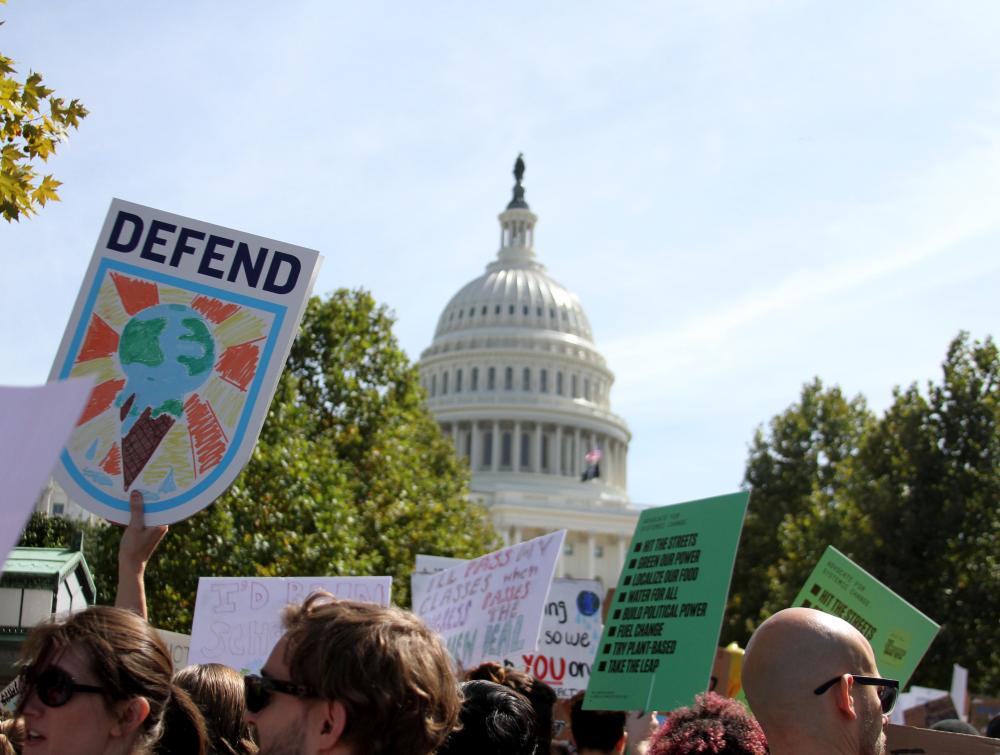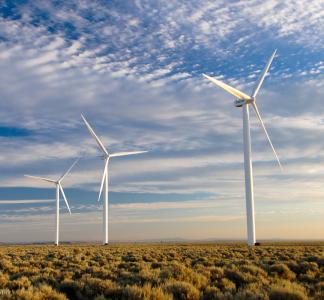A call for a comprehensive climate plan for public lands from the Biden Administration

A sign that says "DEFEND" outside of the nation's capital at the 2019 Global Climate Strike
Carla Ruas
Opportunities to exercise full power of White House, agencies
The urgent need to address the climate crisis takes center stage on the heels of the Biden Administration’s approval of ConocoPhillips’ Willow Project--a project predicted to generate enough oil to release 9.2 million metric tons of planet-warming carbon pollution a year, about the same as adding 2 million cars to the roads.
Willow makes it clear that the administration is making huge climate decisions in a vacuum. Decisions that lock in decades of new development, infrastructure and drilling -- taking us in the wrong direction and well past any 2030, 2040 or 2050 targets.
The administration needs an overall climate plan for public lands that will guide it to better decisions going forward. We need a climate plan for public lands and waters ASAP.
These lands and waters play a critical role in mitigating climate change and supporting local communities. As we look to the Biden Administration to take bold action on climate, it is imperative that a comprehensive climate plan be put in place for our public lands and waters.
Specifically, we’re asking President Biden to urgently pursue these five actions:
-
Phase out fossil fuel development on our public lands
Meaningfully implementing policy changes included in the Inflation Reduction Act of last summer means empowering the Department of the Interior to take lands off the table from oil and gas extraction. The administration must establish a system to align leasing and drilling decisions with climate commitments.
-
Responsibly ramp up renewable energy infrastructure
It is not enough to simply stop drilling. The Bureau of Land Management must ensure that public lands are part of a transition to a renewable energy economy – and that this is done responsibly by taking a smart-from-the-start approach to renewable energy. This smart-from-the-start approach should focus on avoiding and minimizing negative impacts on wildlife, lands and cultural resources. Updating the 2012 Solar Programmatic Environmental Impact Statement and other policies that center community and Tribal engagement alongside ensuring responsible renewable energy development can support commitments to Tribal sovereignty, environmental justice, climate protection and biodiversity conservation all at once.
-
Protect natural carbon sinks like old growth forests and wetlands
In addition to responsibly ramping up renewable energy, we recommend that the U.S. Forest Service undertake a climate-focused rulemaking process that protects mature and old growth forests and wetlands, which are uniquely able to capture and store carbon. Both are also more resilient to climate-driven stressors while supporting clean air, water, key habitat and migration corridors for thousands of wildlife species across the nation. Co-management of forest lands with Indigenous partners can meaningfully prioritize the conservation of old-growth forests and wetlands from activities such as logging, wildfire, drought and other climate stressors.
-
Increase landscape conservation through national monuments and wildlife refuges
We recommend that the Biden Administration swiftly and broadly appoint national monuments and wildlife refuges on public lands. Doing so can promote racial justice alongside respecting sovereign Tribes by preserving significant cultural and historical sites, dwindling water sources and access points for communities who bear the unequal impacts of a warming climate. These conservation actions can also protect wildlife, rebuild our economy through job creation and create natural buffers for our communities against extreme weather and climate disasters.
Further, 90 percent of the 245 million acres of land the Bureau of Land Management currently manages are open to oil and gas leasing. The Bureau should direct managers to identify, evaluate and designate new protected areas critical for climate adaptation, habitat conservation and connectivity and safeguarding cultural resources and community resilience.
-
Center community input, especially from tribes and communities of color, in decision making
The Biden administration must center people in all its environmental reviews by improving public transparency, more meaningfully involving Tribal governments and communities of color who have been stewards of these lands for generations. It must also do everything in the government’s power to mitigate harmful impacts of a changing climate to frontline communities. The upcoming National Environmental Policy Act (NEPA) rulemaking process is a great place to start. During this process, the administration must fully restore, strengthen and modernize NEPA’s implementing regulations, including by making key provisions of the White House Council on Environmental Quality guidance on climate change impacts permanent law.
Because of the lasting harm the Willow Project will have on local Indigenous communities such as Nuiqsut, as well as the tremendous groundswell of support for #StopWillow, the Biden administration should also halt further leasing, exploration and permitting in the Western Arctic (the Reserve) until it develops a climate plan for public lands.
Together, this suite of recommendations would represent the kind of comprehensive climate plan for public lands that would truly harness their potential to help the Biden administration meet its climate goals. Implementing these recommendations will require ambition, urgency and resolve.
We cannot let fossil fuel CEOs and their lobbyists and political allies decide our future. We need the administration to exercise the power of the White House and federal agencies to make sure that doesn’t happen.



